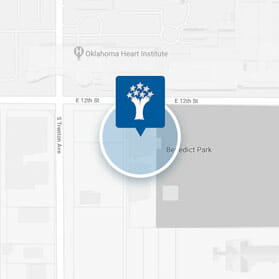Understanding Health Care Costs and Estimating Your Cost of Care
Parkside Psychiatric Hospital & Clinic has agreements with many insurance companies that determine the amount we will be paid. Our team will verify your insurance coverage and benefits, including your plan’s required co-payments, deductible cost, co-insurance and maximum out-of-pocket cost specified in your plan. We can also discuss your payment options. We recommend you call us at 918-588-8850.
Parkside Psychiatric Hospital & Clinic has a financial assistance policy
Information about healthcare costs:
- Charges are the full retail price for hospital or hospital outpatient services.
- The discount price is a lower rate that may be negotiated with payers (“contractual rate” or “allowable rate”) or with patients (“self-pay discounts”).
- The final patient cost is the individual patient financial responsibility (your cost for services based on your benefit coverage and the discounted price). This usually takes several calculations to determine.
How much is paid by the insurance company, and how much is your responsibility, depends on your plan’s cost sharing arrangement some information you may find helpful:
- Copay: In a traditional copay plan, you pay a fixed amount per service. For example, if your copay is $40, you are expected to pay $40 and your insurance will pay the remaining balance. You may have a copayment for office visits and a different copayment for hospital services. You will have to understand your individual plan to estimate your actual costs.
- Coinsurance: In a coinsurance model, you pay a fixed percentage of each service. For example, if your coinsurance is 20%, you would pay 20% of the insurance company allowable, and the insurance company would pay the remaining amount.
- Deductible: With a deductible, you pay the entire amount allowed for all services provided until the deductible is met. If your insurance has a $1,000 annual deductible, you will pay the entire allowable amount until your deductible is satisfied. The deductible starts over every plan year.
- Out-of-pocket maximum: This is the absolute maximum you are expected to pay in cost sharing within a plan year. In contrast to your deductible, the out-of-pocket maximum refers to your cost sharing arrangement after your deductible has been met. An insurance plan with a $1,000 deductible might have a $1,500 out-of-pocket maximum, coupled with 20% coinsurance.
Unfortunately, health insurance can be complex. Different cost-sharing arrangements may apply depending on different situations. Your insurance may have:
- Variable copays or coinsurance. A plan might have a $25 copay for every doctor visit, 20% coinsurance for every prescription, but a $10 copay for a visit to a therapist. Similarly, a visit to your pediatrician might incur a $30 copay, but a visit to a specialist might incur a $50 copay.
- In-network or out-of-network status. To encourage your use of in-network providers, a plan might have a 20% coinsurance for an in-network provider but a 50% coinsurance for an out-of-network provider.
- Individual vs. family deductibles and out-of-pocket limits. This is important if more than one family member is covered on the same plan. For example, your plan may have a $2,000 deductible. If you spend $700 on allowed services for each of your three children on the plan, you will have met a family deductible, having paid $2,100. However, if your plan also has individual deductibles of $1,000, you would still be short $300 ($1000 – $700) of each child’s individual deductible. What counts against the deductible? Deductibles only apply to money you spend on covered services that are billed to the insurance plan. For example, you might reasonably spend $100 or more a year on over-the-counter products like topicals, aspirin and allergy medications. However, since you paid cash at the pharmacy and a claim was not sent to your insurance plan, the insurance plan has no way of tracking what you spent. The $100 does not get credited against your deductible. Similarly, you might spend $250 on eyeglasses at the optometrist’s office. The optometrist might bill your insurance, but if your insurance determines that vision services are not covered, you are still responsible for the entire $250, and you do not receive credit for the $250 against your deductible.
You must have knowledge of your deductible and your qualifying payments in order to generate an estimate. Creating your own estimate Parkside will be happy to work with you to estimate your care. Our Business Office Specialists work with insurance and claims daily and are the best resource for your estimating needs. You can call them at 918-588-8850.
Some payments are by DRG Methodology. A diagnosis-related group (DRG) is a patient classification system that standardizes prospective payment to hospitals and encourages cost containment initiatives. In general, a DRG payment covers all charges associated with an inpatient stay from the time of admission to discharge. DRG payment is based on the care given to and resources used by a “typical” patient within the group. When the cost of treating a specific patient is unusually high compared to a typical patient in the same DRG classification, the case is referred to as an outlier. There may be provisions for employing a different methodology of calculating payment in outlier situations. An average DRG remittance at Parkside is $5,545.24. If your care will be paid by DRG methodology, you can call the business office at 918-588-8850 to discuss what that includes and exactly what this information means to you.
Understanding hospital pricing and reimbursements is complex. On January 1, 2021, hospitals were required to provide a listing of standard charges, payer-specific negotiated charges, discounted cash prices and a consumer means of estimating costs of care. Parkside is fully compliant with these requirements with information accessible on this page, but given the complexities of estimating accurately, you are encouraged to contact the specialists in the business office for personal assistance.
Estimating the costs of your care:
Please read and agree to this disclaimer so that you are fully aware of the variations that can occur when comparing prices in health care. The estimated charges provided on the linked tables and pages are intended to give patients an estimate of the prices and payments for the more commonly provided services at Parkside Psychiatric Hospital & Clinic. Information is provided for an estimate only and is in no way a quote or a guarantee of the amount that you will owe or what the charges for a service will be. The estimates cannot and should not be relied on as the actual charges and/or payments you will be responsible for paying, as the actual charges and/or payments may be either lower or higher than the estimates depending upon many factors – including, but not limited to, your treatment needs and choices, actual services rendered, complications and/or severity of your particular health care needs. The estimated charges are based on the information you enter into the estimating tool. Accuracy is in part dependent upon your knowledge of your patient responsibility under your insurance plan. If you have insurance coverage, your insurance policy coverage (including deductibles, network coverage, co-pay, co-insurance and out-of-pocket maximums) will help determine the amount you owe. The information provided on the pricing tables and estimating tool is not a contract for the actual amount patients will be required to pay. You will be held responsible for the actual amount you owe determined, in coordination with your insurance, after services are rendered. Note: The estimated cost is not a guarantee of insurance coverage. Please check with your insurance company if you need help understanding your benefits for the service chosen. I HAVE READ AND UNDERSTAND THE ABOVE DISCLAIMER AGREEMENT AND I FULLY UNDERSTAND THAT THE INFORMATION ON THE FOLLOWING PAGES ARE AVAILABLE FOR ESTIMATES ONLY. THE ACTUAL AMOUNT I WILL BE REQUIRED TO PAY MAY BE, AND LIKELY WILL BE, DIFFERENT (HIGHER OR LOWER). I UNDERSTAND AND AGREE AND DESIRE TO WORK ON MY OWN COST ESTIMATING AND PRICING. I’d like to work on an Inpatient treatment estimate, Residential treatment estimate, or Outpatient service estimate.
You can view the negotiated pricing table including Standard Charges to help generate your own cost estimate.
If you have questions about estimated service costs, your current bill or financial assistance, please call us at 918-588-8850. Parkside can help.
Parkside has a financial assistance policy and may be able to help. You can call our business office at 918-588-8850. Business office representatives can help you determine if you meet specific income guidelines and can qualify for financial assistance. To review the Financial Assistance Policy click here . To obtain the financial assistance eligibility Application, click here .






